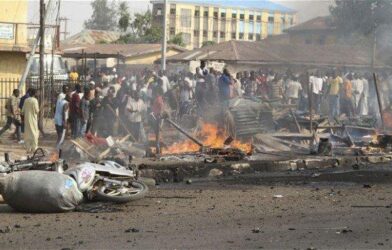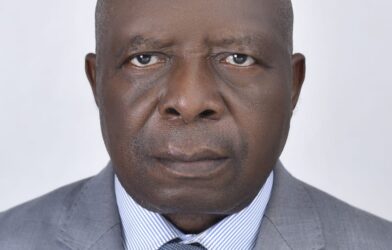9
I sat back somewhere at the Central Business district of Abuja one morning last week, and I actually planned to just sip my cup of coffee and then to disappear to my place of work in Garki II, to try to catch up on lots of correspondence and messages that I couldn’t treat because of a brief business trip outside Abuja.
But my plan to leave the coffee shop as quickly as I had settled down on my desk changed. The arrival of a lady I have known for over a decade on the social media changed my scheduled exit from the coffee shop.
This was because since we became social media friends, that encounter was our first physical meeting.
As we were exchanging pleasantries, the lady then said she was actually meant to discuss a topic that should interest us in our organization, being that we promote the respect for the Human Rights of all. She admitted reading through some media reports about some public enlightenment engagements we did last year in public schools in the South East on the dangers of hard drugs and the need for school children to keep away from hard drugs.
As I obliged her request, she then opened up to me that she noticed that around her area in Lagos that school kids abuse hard drugs much more frequently now than ever before.
She actually came with her last born, a girl in her early twenties who is in a fourth year in a tertiary Institution in Lagos studying economics. She said her daughter has always narrated to her how so pervasive the abuse of hard drugs has become in her campus.
She then said that even her son who is in a University in Canada, had also reported to her that many students in his school are in the treacherous habit of drug abuse. The boy told the mother that knife violence has increased and that one of his course mates was stabbed to death by a student that is under the influence of hard drugs.
We were in the middle of our discussion after I had assured her that the current leadership of NDLEA has done so much to combat drug abuses by students, but suddenly a story broke out about a gun fight in a secondary school in lifecamp area near the official residence of the minister of the FCT. A popular online newspaper broke the story.
It said that report reaching them says three students have been shot at Lifecamp Government Secondary School, in Abuja, Federal Capital Territory, FCT.
The students were reportedly shot by some boys who came to the school with guns.
A highly placed source who disclosed this to our correspondent said the incident happened on Thursday within the school premises.
The incident occurred 500 meters away from the residence of the Minister of the Federal Capital Territory, Nyesom Wike.
Speaking with the online medium, the source said gun violence in the school is becoming a yearly routine.
He said: “Bad boys came to school with guns to fight, three students were shot and police came late.
“I don’t know if you can raise awareness about this issue, this shouldn’t be happening in the heart of Abuja by small children and nobody is doing or saying anything. It seems to be a trend every year something deadly must happen in that school.
“Blood everywhere, parents crying like babies.
“Lifecamp Government Secondary School is directly opposite Lifecamp Police Station and about 500 metres from the residence of the FCT Minister. This is a repeat of what happened yesterday. It happens regularly.”
The spokesperson of the FCT Police Command, Josephine Adeh, confirmed the incident when contacted by the that medium.
“I can confirm that there was an incident there and the Commissioner of Police has ordered an investigation,” Adeh said.
Experts have warned that state governments must double up efforts to partner with NDLEA to stamp out the hard drugs’ apocalypse that is eclipsing most public and private schools. Experts have listed out some of the few hard drugs that are doing so much harm to students in Nigeria.
They are: CANNABIS: Also known by other street names as Mary Jane, kush, pot, Marijuana, Eja, blaze, ganja, etc.
The psychoactive component of Cannabis – tetrahydrocannabinol, or THC – is thought to have evolved as a botanical self-defense chemical, and is present in a subset of the hemp family of plants. Marijuana is the most widely used illegal drug and is probably the most easily accessible in the world.
THE EFFECTS OF CANNABIS ARE:
Some of the common side effects of cannabis include;
An altered state of consciousness. The user may feel “high”, very happy, euphoric, relaxed, sociable and uninhibited.
Distorted perceptions of time and space. The user may feel more sensitive to things around them, and may also experience a more vivid sense of taste, sight, smell, and hearing.
Increased pulse and heart rate, bloodshot eyes, dilated pupils and often increased appetite.
Impaired coordination and concentration, making activities such as driving a car or operating machinery difficult and dangerous.
Negative experiences, such as anxiousness, panic, self-consciousness and paranoid thoughts.
People who use large quantities of cannabis may become sedated or disoriented and may experience toxic psychosis – not knowing who they are, where they are, or what time it is. High doses may also cause fluctuating emotions, fragmentary thoughts, paranoia, panic attacks, hallucinations and feelings of unreality.
The effects of cannabis are felt within minutes, reach their peak in 10 to 30 minutes, and may linger for two or three hours. THC is highly lipid soluble and can be stored in fat cells potentially for several months. The stored THC is released very slowly, and unevenly, back into the bloodstream.
Red eyes to mention a few.
The other hard drig is CRACK just as expert said that as opposed to powder, crack is a free base form of cocaine that can be smoked. It offers a short but intense high to smokers. It comes in solid blocks or crystals varying in colour from yellow to pale rose or white. Crack is heated and smoked.
It is so named because it makes a cracking or popping sound when heated. Crack is riskier and more potent than regular powder cocaine.
HERE ARE THE EFFECTS OF CRACK:
Loss of appetite; Increased heart rate, blood pressure, body temperature; Contracted blood vessels; Increased rate of breathing; Dilated pupils; Disturbed sleep patterns; Nausea
Hyperstimulation; Bizarre, erratic, sometimes violent behaviour; Hallucinations, hyperexcitability, irritability;
Tactile hallucination that creates the illusion of bugs burrowing under the skin
Intense euphoria; Anxiety and paranoia; Depression; Intense drug craving
Panic and psychosis; Convulsions, seizures and sudden death from high doses (even one time), so experts stated.
Another hard drug is TRAMADOL. Scholars say that Tramadol oral tablet is a prescription drug that is available as the brand-name drugs Ultram (immediate-release tablet) and Ultram ER (extended-release tablet). Tramadol extended-release oral capsule is available as the brand-name drug Conzip. Immediate-release drugs are released into the body right away. Extended-release drugs are released into the body slowly over time.
All three forms of tramadol are also available as generic drugs. Generic drugs usually cost less. In some cases, they may not be available in every strength or form as the brand-name version, so says a reputable scholar and an expert on narcotics.
The writer stated that Tramadol is a controlled substance in some countries. This means it can only be used with a doctor’s close supervision. Tramadol is not a controlled prescribed drug in Nigeria
Tramadol is a narcotic-like pain reliever used in treating mild to severe pain.
Tramadol can stop or slow your breathing and can also cause seizures. Tramadol may be habit-forming, even at regular doses.
EFFECTS OF TRAMADOL ACCORDINT TO SCHOLARS ARE: Abdominal or stomach fullness; abnormal or decreased touch sensation; blisters under the skin; bloating; blood in the urine; blood pressure increased; blurred vision; change in walking and balance; chest pain or discomfort; chills; convulsions (seizures); darkened urine; difficult urination; dizziness or light-headedness when getting up from a lying or sitting position; fainting; fast heartbeat; frequent urge to urinate; gaseous abdominal or stomach pain,
indigestion; irregular heartbeat; loss of memory; numbness and tingling of the face, fingers, or toes; numbness, tingling, pain, or weakness in the hands or feet; pain in the arms, legs, or lower back, especially pain in the calves or heels upon exertion; pain or discomfort in the arms, jaw, back, or neck; pains in the stomach, side, or abdomen, possibly radiating to the back; pale bluish-coloured or cold hands or feet
recurrent fever; seeing, hearing or feeling things that are not there severe cramping; severe nausea; severe redness, swelling, and itching of the skin; sweats; trembling and shaking of the hands or feet; trouble performing routine tasks; weak or absent pulses in the legs; yellow eyes or skin
Tramadol is also used as a treatment for premature ejaculation during sexual intercourse but may have other negative effects like erectile dysfunction.
Other drugs of abuse by school children are; Codeine, Rohypnol (Roofies), Aphrodisiacs; and Skunk
As God would have it, the very next day was the solemn passing out parade of some freshly minted counter-narcotic officers at the training faculty of the NDLEA in the serene city of Jos in Plateau State.
The occasion further reinforced the determination of the NDLEA to combat all sorts of drug abuses and trafficking in Nigeria.
The Chairman/Chief Executive Officer of the National Drug Law Enforcement Agency, NDLEA, Brig. Gen. Mohamed Buba Marwa (Retd) at the solemn occasion, warned that there will be no room for internal sabotage in the renewed war against substance abuse and illicit drug trafficking in the country.
General Marwa gave the warning in his remarks at the passing out ceremony of additional 2,500 cadets of Senior Officers Basic Course 16 on Thursday 30th November 2023 at the NDLEA Academy, Jos Plateau state.
While reminding the graduands that the ceremony completes the addition of 5,000 personnel to the NDLEA workforce, he charged them to make their impact felt.
According to him, “Within that 30 years, the world of illicit drugs had become complex and more devastating to society, and the dynamics of the Nigerian drug situation had become more dire. That was why the 2018 Drug Use Survey jolted Nigeria and sounded the alarm bell on the inevitability of arresting the situation. Hence, some 35 months ago, in January 2021, NDLEA was handed a lifeline to rejig its structure and improve its systems to counter contemporary drug problems.
His words: “Today’s passing out ceremony, coming after months of rigorous training, is one of the manifestations of the ongoing restructuring in the Agency. Having another batch of 5, 000 officers to strengthen our workforce will assuredly give the needed impetus to the fight against the abuse and trafficking of illicit substances.
In the tradition of our noble organisation and according to global best practices, he informed that this batch of officers has been trained to be efficient drug law enforcement agents.
“They have spent the past months in training, where they have learnt the intricacies of drug law enforcement and know that their job demands sacrifice, loyalty, and discipline. I have no doubt that they are aware of their position as an important cog in the law and order system of society.”
While welcoming the new Assistant Superintendents of Narcotics to the Agency, he said “I assure you that you are coming into this organisation at an interesting time when reforms are being implemented and plans have been laid for the next phase of action to curb drug abuse and trafficking in Nigeria.
“I must prepare your minds for the task ahead of you. The duties are such that there is no room for compromising the ethics of your profession or subverting the goals of the organisation. In our renewed campaign against illicit drugs, we are at a stage of ramped-up interdiction against cannabis, opioids, and other psychoactive substances. We cannot afford to decelerate our effort and we will not tolerate sabotage from within. What that means is that the injection of an additional 5, 000 officers must have an immediate and far-reaching impact on the campaign. In other words: everyone must make their effort count.”
Justifying his charge to all officers, men and women of the Agency, Marwa who was represented at the ceremony by the Director Planning, Research and Statistics, Victoria Egbase, said “We have seen the truth come back full circle in the past few weeks, whereby some of the world’s known abusers of cannabis have come out to tell the public they are either quitting or have been diagnosed with some ailment, notably emphysema, which puts them at risk of early death and mental harm. That should further add impetus to our collective effort to rid our society of the menace of cannabis and other such dangerous substances.”
“For us in NDLEA, we hold our duty sacrosanct, and our duty is to do everything within the ambit of the law to cleanse our society of the menace of illicit substances”, he stated, adding that “we have shifted gears to become proactive by creating a number of goal-oriented programmes and efficient mechanisms, such as Offensive Action and War Against Drug Abuse (WADA) advocacy.”
He warned the new officers that they must not be found wanting in the discharge of their responsibilities. “We are currently on the verge of expanding our presence to all 774 local government areas in the country. What that should tell our new officers is that there is work to do, and you cannot afford to be complacent or compromise the high standards we have set. On that note, let me also inform you that you must not fraternise with offenders of drug trafficking laws. Doing so is dangerous to your safety; it is catastrophic to your career; it sabotages organisational goals; and it is inimical to society’s wellbeing.
The chief executive told the audience that asofficers in NDLEA, remembering this nugget of advice and abiding by it will ensure you a colourful and gratifying career.
He commended the leadership of the NDLEA Academy and its team of instructors for the success of the training. “I am proud to say that in less than two years, they have shown their mettle and successfully trained 10,000 cadets. This is historic for NDLEA”, he added.
The NDLEA boss also expressed appreciation to the people and government of Plateau State; the Gbong Gwom Jos, Da. Jacob Gyang Buba; the management of FRSC Training School, Jos; the Nigerian Army and other sister agencies in Plateau State for their unwavering support for NDLEA.
Emmanuel Onwubiko Writes From Abuja












Comments are closed